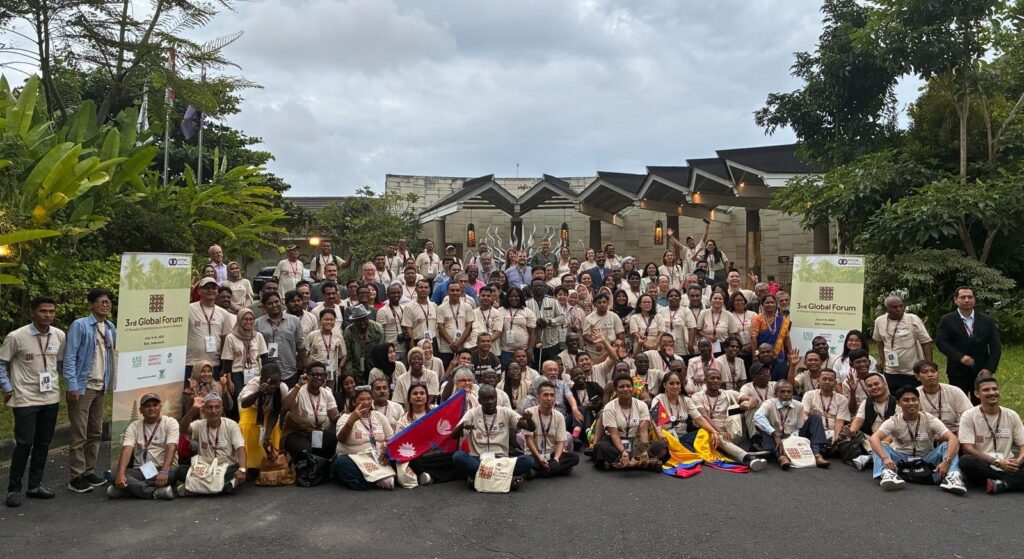TOKYO, July 7, 2025– In a landmark gathering that placed lived experience at the center of global health discourse, the 3rd Global Forum of People’s Organizations on Hansen’s Disease was held in Bali, Indonesia, from July 4 to 6, 2025. Organized by the Sasakawa Leprosy (Hansen’s Disease) Initiative, the event brought together over 110 representatives of organizations of persons affected by Hansen’s disease from 21 countries. They were joined by key stakeholders such as the World Health Organization (WHO), the United Nations Special Rapporteur, supporting NGOs, the International Leprosy Congress (ILC), the International Leprosy Association (ILA), and others.

Held just ahead of the 22nd ILC, the Forum aimed to present its outcomes to the global health community during the ILC. Building on the previous Forums in Manila (2019) and Hyderabad (2022), this third edition was led by Dr. Alice Cruz, former UN Special Rapporteur and current human rights advisor to the Initiative, who spent a year preparing the event in collaboration with the community.
Adopting a people-centered approach, the Forum’s design was shaped directly by persons affected by the disease through surveys, regional meetings, and needs assessments led by their organizations. This ensured that the program reflected their voices and priorities.
Opening the Forum, Dr. Takahiro Nanri, President of Sasakawa Health Foundation, stated:
“This Forum belongs to you. You are here not just for yourselves, but for countless brothers and sisters whose voices remain unheard.” He called on participants to “turn inclusion into action,” emphasizing that change begins with small, concrete steps taken by their own organizations.
The Forum produced three Key Outputs:
- Letter of Commitment – pledging to build resilient organizations and act at all levels.
- Recommendations to Stakeholders – urging governments, health systems, schools, businesses, the media, and development actors to uphold the rights and dignity of persons affected.
- Action Plan for Capacity-Building – to strengthen networks, secure sustainable funding, develop leadership, and improve access to tools and data.
On the final day, participants held a roundtable with stakeholders such as WHO, the UN, and NGOs. Stakeholders gave direct feedback and affirmed their support for implementing the Forum’s outputs—marking a step toward concrete action and shared accountability.
Mr. Yohei Sasakawa, WHO Goodwill Ambassador for Leprosy Elimination, addressed participants with a message of support: “I sincerely thank you for standing up despite hardships, creating organizations, and working for your fellow persons affected by Hansen’s disease. I will support you however I can. Achieving WHO’s goal of towards zero leprosy by 2030 will not be possible without your strength.”
As part of the Forum’s legacy, 19 organizations began presenting posters at the ILC starting July 7, based on the needs assessments they conducted. These posters highlight community-defined challenges and priorities, offering insights within an international academic setting.
At the Inauguration Session of the ILC on the same day, Mr. Al Kadri (PerMaTa Indonesia) and Ms. Evarestus Lilibeth Nwakaego (Purple Hope Initiative Nigeria) presented a summary of the Forum’s three Key Outputs, conveying the voices and priorities of persons affected by Hansen’s disease to global health leaders.
The Forum was more than a conference—it was a platform for action, designed and led by persons affected by Hansen’s disease. The commitments made and solidarity shared in Bali will continue to inspire hope across communities worldwide.
About Hansen’s Disease
Hansen’s disease, also known as leprosy, is an infectious disease that primarily affects the skin and peripheral nerves. Around 200,000 new cases, including children, are still reported annually, indicating ongoing transmission. Though curable with multidrug therapy, delayed diagnosis can cause permanent disability. Stigma and misconceptions persist, and even cured individuals and their families often face discrimination in education, employment, and social participation. The Sasakawa Leprosy (Hansen’s Disease) Initiative works to strengthen national programs and empower persons affected by the disease to achieve a world free of both the disease and the discrimination it causes.
About Sasakawa Leprosy (Hansen’s Disease) Initiative
Sasakawa Leprosy Initiative is a strategic alliance of WHO Goodwill Ambassador for Leprosy Elimination Yohei Sasakawa, the Sasakawa Health Foundation and The Nippon Foundation to realize a leprosy-free world. Since 1975, it has supported governments in their fight against leprosy through the WHO, contributing more than US$200 million. It has also made significant contributions to support organizations of persons affected by leprosy and has been instrumental in bringing leprosy to the attention of the United Nations, resulting in the adoption of several UN resolutions on the elimination of discrimination against persons affected by leprosy and their family members.


